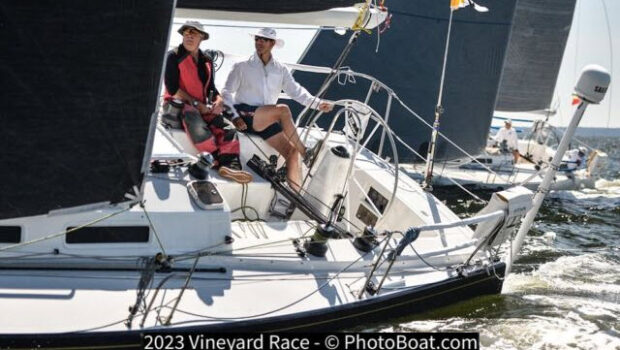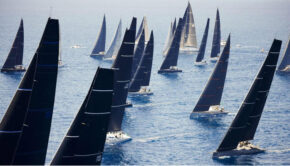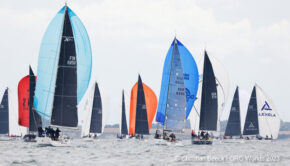Fairness questions amid complex scoring
Published on May 13th, 2024
For rating rules to most accurately assess the performance of dissimilar boats, it is necessary to consider the weather conditions when they compete. However, this adds complexity to scoring races, and as Naval architect Brendan Dobroth reports, creates unsettling questions about fairness:
As a youth sailor, I competed in a local Junior Championship to advance to the Nationals. It was an important series, and we were involved in a starting line collision. We were to leeward, and another boat was barging at the start. We went to the protest room with witnesses, including a witness from the Race Committee boat.
We were thrown out of the race, but then we heard some heated commotion from the protest room at the club. About an hour later, I was asked to return to the protest room. We had been reinstated, and the other boat was scored DSQ. What we learned later was that the other sailor’s “Uncle Bob” happened to be the head of the Protest Committee.
Many years and races later, I was sailing in a large IMS fleet, day racing over four days. At the end of one day, the results were posted, we were doing well in the fleet, and everyone was happy. However, later that night, the owner of the boat called me. All the day’s scoring results had changed, the overall points had shifted, and the owner needed help understanding what happened.
We had sailed the day’s races with heavy one Genoas and ¾ oz. Spinnakers. (some of you may remember symmetric spinnakers). I had some fluency with IMS scoring and determined the original scoring used 12 knots of wind speed which seemed right.
But using our certificate, I saw that the results were re-scored using 6 knots of wind speed. That did not seem right. At 6 knots of wind speed, people are to leeward to try and heel the boat. Tacking angles are around 90 degrees. We were fully hiking all day and tacking around 75 degrees.
With this change, one boat received very favorable results. I spoke to the owner of the boat and explained what had happened. Many unhappy people, including other boats, made several phone calls. The original results were reposted.
Well, one more round as this past year, I was involved in an ORC distance race which required protests and appeals to resolve the scoring errors.
For many years, the scoring for this race used Single-Point AP (All-Purpose) scoring, although the Sailing Instructions still mentioned Coastal AP scoring, which was renamed to Single-Number AP scoring. (The Sailing Instructions stayed the same for years but did not reflect the name change.) Coastal AP scoring was replaced or renamed to Single Point AP scoring in 2020.
We finished the race, and Single Point AP was used for scoring like in the past with the same SIs and NORs, with the results posted on yachtscoring.com. However, much later the results were changed to Triple-Point scoring, and the results had shifted. Neither the SIs nor the (NORs mentioned Triple-Point scoring.
The results were protested in which the Race Committee claimed they announced the change in ORC scoring via VHF radio a little after noon when the smaller PHRF boats were starting. Most of the bigger ORC boats start much later, and our start was around 1:20 PM, with the crew having lunch at the dock at noon, outside the range of any VHF announcement.
Whether announced or not, the Race Committee violated the SIs which stated that any changes must be made before 8 AM on the day of racing. The RC did announce the course selection before 8 AM. (There was a PRO on the RC.)
The appeal was lengthy and time-consuming, and the results did not matter to me as much as the Race Committee’s ability to score or change the scoring after the race. The scoring in the SIs and NORs should be followed, and it should be specific. The rules are not perfect, but at least they are rules, and you should know what they are BEFORE the first gun sounds. There must be a sense of fairness. The appeal was finally granted, and the original scoring was used.
Part of the fun of racing is tactics. Sailing has a risk/reward element. We print out time differences before the start to know how we are doing and who we may cover or split from. Tactics are lost if you do not know the scoring system used as the race progresses.
Why bother having rules if they can be changed after the start of the race?
This brings us to the present day. The 2024 Block Island Race and the 2024 Vinyard Race recently modified the following verbiage under Scoring in the NOR. I believe this appeal directly influenced the newly modified NORs:
[NP] ORC classes, including double-handed, will be scored using a scoring option available in the rule. The RC may announce its intended scoring option prior to the first warning signal. Note that ORC Rating Rule 403.4 allows the RC to change this to a more suitable scoring method if there has been a change in conditions during the race.
9.2.1 The selection of the scoring option and parameters used for the race will be at the sole and absolute discretion of the Race Committee. This includes the length of the course and the wind details such as strength and direction. These will not be grounds for a request for redress by a boat. This changes RRS 60.1(b).
However, this seems to open the door to the “Uncle Bob” effect.
It states that they can do whatever they want before, during, or after the race. They may or may not tell you. There is not even a venue for an appeal. While I greatly respect the Race Committees, and everyone involved in this sport, but this is not a question of honor. It is about setting the rules before the start. Choosing a computer program to select a scoring method is fine; it keeps the human element out of the scoring. The scoring is defined and specified before the start.
Section 401.1 of the ORC Rule states, “Scoring method, type of course, and custom course model, when used, shall be defined in the Notice of Race and/or Sailing Instructions.”
Section 403.4 National Rating Office as quoted in the new NORs state. “The course type used to calculate these ratings and the methods of how they will be applied shall be specified in the Notice of Race and/or Sailing Instructions of the races and events that use them.”
The terms “shall be defined” and “specified” do not seem to be what the new modified NORs are doing and are not in the spirit of the rule. There is a loss of sense of fairness when or if the scoring can be chosen in any way, and that is not defined before we cross the starting line.
This is not about questioning the integrity of the Committees; no one needs to defend their integrity. We all know Committees have friends in the fleet. The newly modified NOR’s scoring opens the door for “Uncle Bob’s” with their fingers on the scale.
It is simple to score and re-score races with a button push. When you sail in a long series, we do not say, “The RC will announce the number of throw-outs after the regatta.” The overall point of emphasis is that even if the Committee’s actions are entirely above board, this language has, by default, negatively narrowed each competitor’s ability to make coherent, tactical decisions.
It is essential to know where you stand or what tactics to play as the race progresses, and second-guessing or blank questioning takes away from the joy of the sport we all love.









 We’ll keep your information safe.
We’ll keep your information safe.